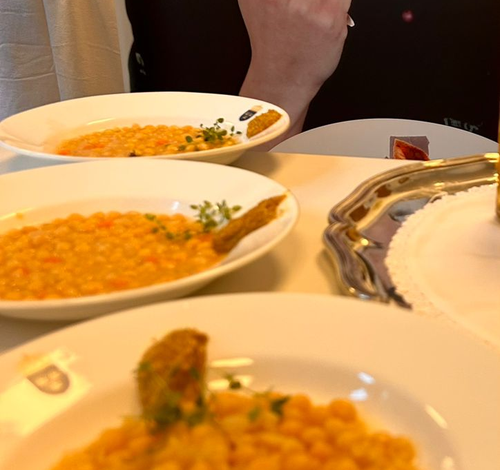Every time I sit down to eat, I become part of land that sustains us: First woman Michelin star Chef Titti Qvarnstrom

New Delhi, Oct 13 : For her, food represents a profound connection between us and the land upon which we reside, and each meal consumed is not just a physical necessity, but a tangible link between ourselves and the environment. “Every time I sit down to eat, I feel like I am becoming a part of the very land that sustains us,” smiles Swedish chef Titti Qvarnström, the first woman in Scandinavia to be awarded a Michelin star for her culinary skills in 2015.
Stressing that the significance of food in her life extends beyond mere sustenance and is a conscious act of acknowledging our relationship with the planet, she says that every ingredient she chooses and every recipe she prepares, carries the weight of this connection. “I am not just eating for myself; but for the land, the ecosystem, and the people who are involved in its production,” she tells IANS.
And this awareness shapes her food choices and cooking practices. Qvarnström places great importance on understanding where the food comes from, how it is grown or raised, and the impact it has on the environment. “This means supporting sustainable farming practices, reducing food waste, and opting for locally sourced produce whenever possible,” adds the chef under whose leadership ‘Bloom in the Park Restaurant’ in Malmö was awarded ‘Best Restaurant in Sweden’.
For this chef, whose signature dish is the traditional pea soup, it is extremely important to be mindful of the impact food has on the body — it is in fact about nourishing ourselves in a way that respects the intricate relationship between human bodies and the earth.
Admitting that being the first woman in the Nordic edition of the guide to win a star is a source of immense pride, she feels it is a validation of the hard work, dedication, and passion she has poured into her culinary journey.
“Receiving that star is like a big, warm pat on the shoulder, assuring me that I have been doing something right, that my cooking has resonated with people, and that it’s been appreciated at the highest level. It is not just a personal achievement; it’s a testament to the talented team that I work with and the support of my loyal customers who have been with me on this gastronomic adventure.
As the first woman to earn a Michelin star in the Nordic edition of the guide, I also feel a sense of responsibility. I hope my achievement inspires and paves the way for more talented female chefs to break barriers and achieve their culinary dreams. It is a reminder that the culinary world is diverse and that talent knows no gender,” says Qvarnström, who recently held a Masterclass dedicated to the ‘International Year of Millets’, with focus on Indian ingredient millets and sustainability at the Embassy of Sweden in the national capital.
Believe it or not, for this internationally renowned chef, the initial path was actually leading toward academia. Pursuing a more traditional education, focusing on theoretical knowledge and research, everything changed for one summer when she stumbled into a job at a restaurant. While she had no culinary training or experience to speak of, that job turned out to be a life-altering experience.
“It was like a sudden epiphany. Working in that restaurant opened my eyes to a world where I could be creative, work with my hands, and craft something tangible and meaningful. I discovered the joy of creating dishes that not only satisfied people’s hunger, but also brought them genuine pleasure.”
Looking back, she says it might have taken her a little longer to realize her true calling, but that serendipitous summer job was the turning point that set her on the path to becoming a chef.
She feels one of the most exciting aspects of her journey has been the opportunity to travel and work in various parts of the world. That being a chef, one can ‘pack’ her/his skills and passion and take them to virtually any corner of the globe.
“It has allowed me to meet incredible people, learn about their food cultures, and exchange ideas with fellow chefs from all over. But perhaps one of the most rewarding aspects of my journey as a chef is the joy of serving good food to others. Food has a unique ability to connect people.”
This may be her first trip to India but she has decided on her favourite dish here — ‘Chole Bhature’. Bowled over by the flavors, spices, and the sheer variety of vegetarian options here has been a revelation.
“It is remarkable how a significant portion of the population here follows a vegetarian or vegan diet, and seems to be thriving. This is quite different from the perceptions in Sweden, where a vegetarian diet was often met with skepticism not too long ago. It is eye-opening to witness how millions of people in India have been following these dietary practices for generations, and it is something that we can definitely learn from back home. I am eager to explore more of this incredible nation and delve deeper into its cultural and culinary treasures.”
While kitchens may be dominated by male chefs the world over, she feels working alongside a majority of male colleagues has not been a significant issue and the gender dynamics of the kitchen have not really bothered her much. “Like many other professions, succeeding in the culinary field does require a certain level of determination and assertiveness. It is essential to have what I like to call ‘pointy elbows’ — the ability to assert yourself and stand your ground when necessary. The kitchen can be a demanding and intense place, and you need to develop a tough exterior to excel in your occupation.”






